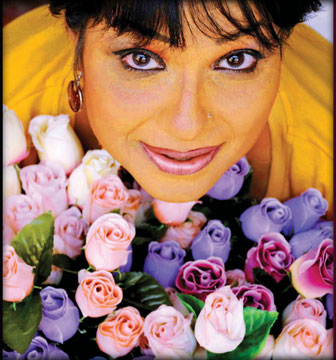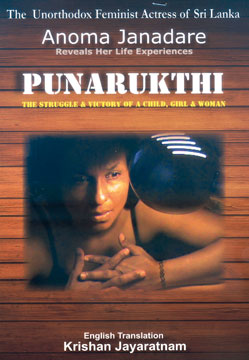Profile of an untold social saga of our times
by Charith Perera
|

Anoma Janadare
|
Anoma Janadare's maiden novel 'Punarukti' became a controversial
Sinhala novel as soon as it hit the local literary market. It came under
a harsh criticism in the mainstream Sinhalese prient media. There were
schools of opinions regarding the literary merits and demerits of the
novel Punarukti. It was widely condemned as a hearsay as the plot is
woven around Anoma Janadare, controversial actress in alternative
Sinhalese cinema. Critics were divided into several groups in analysing
the literary values of the novel. However, it became a best-seller
during the year 2011 and 2012 and also the novel which stirred a
discussion among the contemporary Sri Lankan literati. Once again, it
becomes a hot topic as Punarukti's English translation has now been out.
The English translation was launched on May 3 before a cosmopolitan
audience in Colombo.
Excerpts of an interview with Anoma Janadare.
Question: Have you given up acting or would you intend to be a
professional writer?
Answer: I am a full-time professional actor. Even recently I
acted in a stageplay. I played a role in a teledrama by Santhush
Liyanage and refused to act in a film. Last month, I commenced work on a
film and I am completely absorbed myself in directing the film. Then,
how could I become a full-time professional writer. I have so far
written only one book which is Punarutti and Chrishan Jayaratnum did the
English translation of Punarutti.
Q: It was on your birthday on May 3, 2011 you launched your
novel Punarutti and the English translation was launched on May 3, 2013.
This is significant given the fact that most of the actors and actress
celebrate their birthdays with their friends in grand parties. What made
you to celebrate your birthday in a different manner?
A: Particularly, actors and actresses are mesmerised before
the art. It's not that they have mesmerised by the art. All these
mesmerisation happens against the capitalist economic backdrop. The
first counsel I received from my teachers such as Duglas Siriwardena,
Parakkrama Niriella, H.A Perera and Wasatha Hettiarachchi was not to
fall into this illusion but to learn the craft and improve the knowledge
of arts. I think my birthday is the best day for such an activity.
Socialism
 Q: When you launched Punarutti, there was a group who
vehemently against it and they attacked it as soon as it hits the
market? Q: When you launched Punarutti, there was a group who
vehemently against it and they attacked it as soon as it hits the
market?
A: The very basis of my artistic life was socialism and I
stood for my stance, making very costly sacrifices. But, when the
leadership morally decayed and culturally bankrupt, I began to repent
for the sacrifices I made. It was not for the first time in life that I
left all the materials I gathered and virtually walked onto the street
with bare hands. They were afraid that I had written about them in
Punarutti. It was like putting the cart before the horse.
Q: What is the central theme of the novel Punarutti?
A: It's an important question. I will try to put it in a few
words. I would like to introduce the theme of this novel is 'a girl who
fought against religious and patriarchic violence'.
Q: What normally would happen is that a girl would succumb to
patriarchic violence and the girl would become a victim or sometimes
killed?
A: The common scenario is that the girl would become a victim.
Mother is directly responsible for this pathetic situation. Mostly
mothers strongly advised girls to behave decently and without expressing
their emotions and the ideal girl should be shy, timid and obedient.
But, boys are allowed to play havoc at home. I fought since my childhood
against this discrimination. I would have definitely to die if I had
been a typically shy girl when I was expelled or virtually thrown out of
the house at a tender age.
Since I am not such a person, I was able to complete my education and
entered the university. Every chapter in the novel encourages girls not
to afraid, shy away before violence perpetrated by men. But, girls
should be independent, unafraid, learn the law of the land and to unite
with other women.
Translation
Q: Punarutti is inconclusive novel. Before you write the
sequel to the novel, you are releasing the English translation of the
novel.What are the objectives of launching the English translation?
A: My life is mine. Although others also are associated with
my experience in social life, I am a person who would make the maximum
attempt to contribute positively to society. Those who associate me
would testify to this fact. If my sacrifices are miscalculated, I would
not waste my time and would immediately leave.
Since my childhood, I harboured the idea that one day I should write
my life experiences. After playing a role in the film 'Flying with one
wing', I looked back on my artistic career. In fact, I thought deeply as
to what made me to reveal my naked body in a film. The result of process
of thinking is the birth of the inconclusive novel Punarutti.
Nakedness
Q: What really made you to scarify your nakedness before
cinema?
A: That's because of me; because I am a woman. For all the
women who enrich the world with their tenderness, motherly love,
procreate; give birth to men and subject to violence, injustices and
harassment perpetrated by men and die, still dying and those who are
destined to die.
Q: Could you tell us about the program of the launch of the
English translation of Punarutti?
A: The chief guest was veteran filmmaker Sumithra Peries. She
delivered a lecture titled Nirdana Kanta Hinsanaya, Anomage Charitayen
Labunu Balaya. (Violence against impoverished women and the empowerment
that Anuma's character gave them). Other lectures included Dr.
Wickramabhanu Karunaratne's Peralikariyage Bhumikava (Role of the
rebellious woman), Manohan Nanayakkara Kantha Iythi Pilibada Jagath
Pravanata (Global trends on women's rights) and Kansul Ferdhouse "
(Women's heritage that should be empowered at school level). A piece
entertainment presented by Mawanella Kulagana Samitiya presented an item
for entertainment.
Q: I hope to continue this discussion with you and the
discussion would conclude only when you release the sequel to Punarutti.
When would you hope to release the sequel to the novel?
A: Earlier I told you that Punarutti is my life story. My life
is made out of numerous sacrifices. I will not allow a culturally
bankrupt person who had bartered his soul for money, to throw it off as
a used stick of wood. I would bloom like a white lotus with my woman's
soul. I will very soon release the sequel to Punarutti.
|


